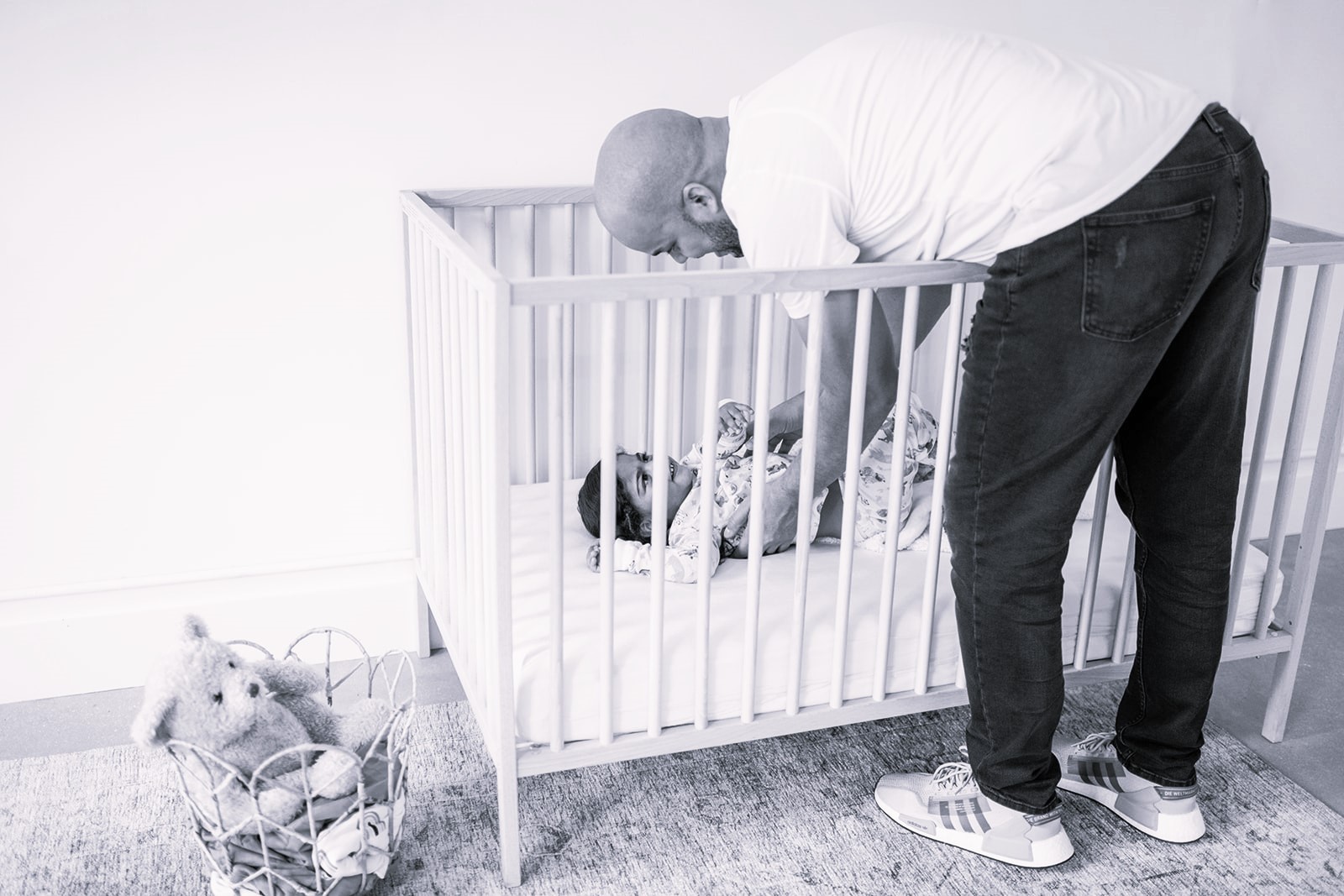
What to do When Baby Wakes in the Night
Night waking is the number one reason that parents come to me for support. Waking in the night is a natural occurrence that we all do. The struggle is when your baby wakes in the night and can’t get themselves back to sleep, resulting in exhaustion for both you AND baby. So, the question becomes…what can I do when baby wakes in the night?
When Baby Wakes in the Night – Wait
If you’ve ever shared a room with a baby then you know that they are noisy sleepers! When you hear your baby waking up in the night just wait before you rush to their side. Wait a few minutes so you can be sure that your little one is truly awake. Babies often squeal, grunt, move around, and even cry in their sleep. Waiting to determine if they are truly awake before picking them up will avoid accidentally waking them up.
We all have natural night wakeups between our sleep cycles, including your baby. For babies a sleep cycle is about 40 minutes long. If you are in the season of having a baby up every hour it’s because they haven’t learned how to link their sleep cycles on their own yet.
Waiting a few minutes before responding gives your baby the opportunity to learn how to link their sleep cycles. They will never learn if you don’t give them the chance. You may be surprised by your baby’s own abilities. Have a little faith in them!
You can use this same strategy if you are also experiencing short naps!
Have a Feeding Plan
Feeding in the night is necessary in those early weeks and months. We all hope that our babies will just wean themselves off these night feedings on their own but it’s not always to case. And I would say it’s rarely the case!
Feeding, whether by breast or bottle is naturally comforting. If your baby is using the breast or bottle as a strategy (A.K.A sleep prop) for falling asleep you may see an increase in night wakeups.
I’m not saying that feeding to sleep is a “bad thing”. I’m saying that you probably found your way to this blog because you want to reduce (or eliminate) your baby’s night wakeups. Maybe feeding to sleep was working for you for a while. I mean who doesn’t love watching a baby drift off to sleep with those little milky smiles? If feeding to sleep is no longer working for you, it is totally fine for you to change your mind. You can offer your baby a new strategy for falling asleep that serves you both better.
If you are ready to reduce night feedings so your baby is only eating when they are HUNGRY, and not just to use the breast or bottle as a pacifier, then you can benefit from having a feeding plan.
Think about how many times your baby realistically needs to eat in the night based on their age and weight. Consult with your medical provider if you aren’t sure.
For example, you decide that your six month old only needs one night feed. Their bedtime is 7pm and the one feeding would feel appropriate halfway through the night (consider a “night” twelve hours). So your feeding would take place ideally around 1am. I am not a fan of waking babies to eat, unless of course it’s necessary for weight gain, so I wouldn’t wake baby at 1am to eat. Instead I would only offer ONE feeding if baby wakes anytime after 1 am. All other night wakeups would require a different soothing strategy for getting to sleep.
Use Other Soothing Techniques
Replacing the Feed to Sleep Strategy
The reason this is the number one struggle parents come to me with is because feeding often becomes the sleep strategy (or sleep prop). It’s a strong association that can become very exhausting. Especially for a mother who is exclusively breastfeeding and therefore becomes the ONLY person who can put baby to sleep.
It is okay if feeding to sleep is no longer serving your family. Momma, you need to take care of your sleep needs as well. With some time, patience and consistency you can shift the sleep strategy for your baby to one that serves you both better.
Okay! So you’ve already decided on a feeding plan for the night (as described above), now the tough part becomes finding a different soothing strategy for when it isn’t feeding time. You have a few options here. You could replace this strategy through sleep training (and yes night feeding and sleep training do go together) so that you baby learns how to put themself back to sleep in the night or by replacing the feeding to sleep with something different.
If you aren’t looking for baby to learn independent sleep right now, that’s okay! You can replace the feed to sleep with something that feels right for you! Something like rocking, or holding hands are great alternatives.
Replacing A Sleep Prop
Maybe feeding to sleep is not the sleep strategy your baby uses to fall back to sleep in the middle of the night. Maybe it’s rocking or coming to your bed in the night. Whatever it is, if it is no longer serving your family well, it’s okay to change it.
Decide on a different strategy that feels better to you and then stick with it. If you no longer want your little coming to your bed at night, then you may want to shift to rocking back to sleep instead. If you no longer want to rock to sleep at night, then you may want to shift to holding hands in the crib to help baby fall back to sleep.
Changing up your baby’s sleep strategy will not necessarily stop the night wakeups or even reduce them. But the purpose of doing this when baby wakes in the night is to use a strategy that feels sustainable for your family.
You can expect some level of protest from your baby. It’s hard to change sleep habits. Be understanding of your baby’s feelings but don’t waver on your consistency. Whenever you decide to make a change, you need to stick to it. Without consistency you send a very confusing message to your baby that only inhibits any progress and results in more tears.
Sleep Training
Sleep training is the process of teaching your baby how to sleep independently. This is a good option to consider if you are ready to eliminate night wakeups or reduce to only waking for a necessary feeding.
If you are wondering where to start, read the blog post I wrote about the different methods of sleep training. I am confident that if you are ready to tackle night wakeups then you find a method that suits your family. If you are looking for a “gentler” method then I recommend using the parent present approach. You can do that one as slow as you feel comfortable with as long as you commit, are exceptionally consistent, and have patience with the process (gentle methods will often take longer).
Have a Secondary Caregiver Handle Night Wakeups
Are you the parent that is always heading the night wakeups?
If can be very helpful (for everyone) to have a different parent or caregiver go in when baby wakes in the night. This is particularly helpful for breastfeeding moms who are trying to separate the feed to sleep association. As a breastfeeding mom it is VERY difficult to try different soothing strategies when you’re dangling the goods right in front of baby’s face.
Babies are creatures of habit and get accustomed to routines easily (usually a great thing but sometimes offers challenges). If their current habit when they wake in the night is to call for you and you go in, pick them up, and rock them back to sleep, then this is their expectation. When you decide that you are going to use a different soothing strategy for getting baby back to sleep, your baby will be confused by this because they expect you to behave the same way you have all the nights before.
A secondary parent (or even a grandparent) can help because baby’s expectations of them are different. Maybe your partner doesn’t handle night wakeups or doesn’t handle them very often. Baby doesn’t have the expectation of them coming in to feed them (especially for breastfed babies) and will be more accepting of the rocking to sleep (or whatever you’ve decided on).
I see a lot of success with this during sleep training because it makes the changes so much easier for both mom and baby.
In Conclusion
Whenever you change things up with your baby’s sleep habits, you can expect things to get worse before they get better. There is a period of adjustment as baby learns the new strategy or works on linking their sleep cycles. The most important thing that you can do during this adjustment period is be CONSISTENT. Without consistency it makes any changes more difficult for the entire family.
Whether you want to reduce or eliminate night waking, it’s important to have a plan – one that you feel comfortable with and that will allow you to reach your goals. Remember to wait until you know baby is awake and give them the opportunity to learn how to link their sleep cycles, decide on a feeding plan and HOW you want baby to fall back to sleep in the night, and finally enlist the help of your partner or another caregiver.
Do you need help creating a plan that works for YOUR family?
Do you need an accountability partner in order to stay consistent?
I would love to help your family! Book your free child sleep evaluation call today so we can chat about how I can support you in making changes to your baby’s sleep habits.



